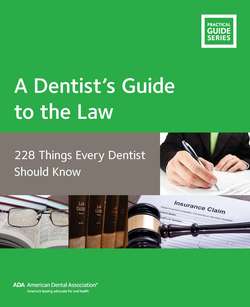Читать книгу A Dentist’s Guide to the Law - American Dental Association - Страница 65
На сайте Литреса книга снята с продажи.
Chapter 7. Practice Marketing 34. What Legal Limits Are There on Advertising My Practice?
ОглавлениеFederal, state and sometimes local law laws govern advertising, which can include promotions offered via websites and social media. The central point for dentists is to make sure their promotional efforts are neither false nor misleading in any material respect and that they have a reasonable basis for making any claims announced.
Most state dental practice acts and other state laws prohibit false, misleading or deceptive advertising. Many of these statutes provide that damages (in some cases treble damages plus attorneys’ fees) are available to the successful plaintiff. Some state laws regulating professionals also contain specific prohibitions on certain types of advertising claims. It is important to check the advertising regulations and rules in your state before advertising.
If the dental practice is planning to use a trade name, a licensing board permit will likely be required (these are sometimes called “fictitious” or “assumed” name permits). State laws regulating businesses may also require registration of assumed business names in either the state or county offices, depending upon the type of business entity in question.
The Federal Trade Commission (FTC) monitors ads and publicity efforts. The FTC provides helpful resources for businesses interested in federal advertising laws and policies, including unfair or deceptive advertising and federal warranty law.
Unfair or deceptive advertising can include:
• Bait-and-switch tactics
• Deceptive demonstrations or prices
• Defamation of the competition
• Fraudulent contests
• Fraudulent testimonials
• Misleading or unsubstantiated claims
• Misuse of the word “free”
Before you send marketing information to patients (or have another party send it on your behalf), or disclose any patient information for marketing purposes, make sure you do not risk violating applicable federal, state, or local laws, such as consumer protection laws, advertising laws, laws regarding testimonials, privacy laws such as HIPAA, or your state’s laws regulating advertising by dentists. You should also understand the impact of any warranties made in an advertising communication.
Your state’s dental advertising laws and regulations may restrict the information that may be included in an advertisement, statements about specialties and services, the use of testimonials, claims about quality or results, the use of paid referral services, offers of gifts or inducements to patients or prospective patients, or statements about pain or sedation. These laws may require dentists to retain copies of advertisements for a period of time. For information about your state’s laws regulating advertising by dentists, contact a qualified attorney. Your state dental society may also have information about your state’s dental advertising laws.
